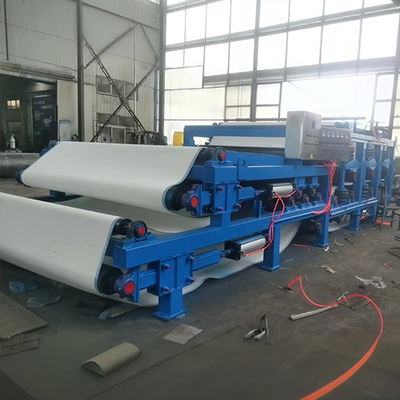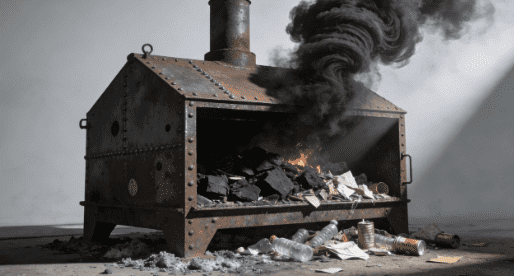Table of Contents
Introduction

In today’s industrial and municipal landscapes, effective sludge treatment plays a critical role in wastewater management and environmental sustainability. With growing pressure to reduce operational costs and adhere to environmental regulations, selecting the right sludge dewatering technology is more crucial than ever. Among various sludge treatment technologies, the Industrial Sludge Belt Filter Press has gained significant attention for its high-efficiency sludge dewatering capabilities.
However, when evaluating the most suitable technology for large-scale operations, cost is a major deciding factor. In this blog, we will explore the cost comparison between the Industrial Sludge Belt Filter Press and other sludge treatment methods, such as sludge drying beds and rotary drum filters. By evaluating the upfront investment, operational costs, energy consumption, maintenance, and long-term savings, this comprehensive guide will help you make an informed decision.
As a leader in the environmental protection sector, Shandong Lushun Environmental Technology Co., Ltd. offers advanced solutions that integrate cutting-edge technology and innovative designs. Our Industrial Sludge Belt Filter Press is engineered to provide both environmental and cost benefits, helping industries across the globe manage sludge treatment more efficiently.
The Importance of Cost-Efficiency in Sludge Dewatering
Sludge dewatering is not only essential for wastewater treatment but also for reducing the volume of waste that must be managed and disposed of. Efficient sludge dewatering minimizes disposal costs and helps to meet regulatory requirements regarding waste reduction. Given the numerous methods available for sludge treatment, cost-effectiveness is a significant factor in deciding which technology to invest in.
The Industrial Sludge Belt Filter Press stands out due to its high-efficiency design and automation, making it a popular choice for large-scale industrial operations. However, it’s important to understand how it compares to other sludge treatment methods in terms of initial investment, operational costs, and long-term savings.
Initial Investment: How Does the Industrial Sludge Belt Filter Press Compare?
The initial investment required for a sludge treatment system is often the first hurdle for businesses. The Industrial Sludge Belt Filter Press, though effective and efficient, usually requires a higher initial outlay compared to traditional methods such as sludge drying beds or rotary drum filters. However, the upfront cost is only part of the equation—long-term operational savings and efficiency play an equally important role.
Comparing Initial Investment Costs
| Equipment Type | Initial Investment Cost | Benefits of Investment | Drawbacks |
|---|---|---|---|
| Industrial Sludge Belt Filter Press | Higher | Continuous operation, space-saving, low labor cost | Higher initial cost |
| Sludge Drying Beds | Lower | Lower capital cost | High operational cost, space-consuming |
| Rotary Drum Filters | Moderate | Moderate investment, reliable | Higher energy consumption, large footprint |
While the Industrial Sludge Belt Filter Press may require a larger initial investment, its continuous operation and low labor requirements lead to greater cost savings in the long term. Unlike traditional methods, it requires less space and offers a more automated approach, which translates into labor savings and reduced operational complexity.
Upfront Costs vs. Long-Term Savings
One of the key advantages of the Industrial Sludge Belt Filter Press lies in its low operational costs, which often outweigh its higher initial price. By reducing the volume of sludge, it minimizes transportation and disposal costs. In comparison, sludge drying beds require significant space and time for sludge to dehydrate, making them less cost-effective in the long run.
Operational Costs: Efficiency and Energy Consumption

Once operational, energy consumption and labor costs become significant factors in assessing the overall cost-effectiveness of sludge treatment technologies. Traditional methods, such as drying beds and rotary drum filters, tend to have higher operational costs due to their lower efficiency and greater reliance on manual labor.
Operational Costs: Energy Efficiency Comparison
| Equipment Type | Energy Consumption | Labor Costs | Operational Efficiency |
|---|---|---|---|
| Industrial Sludge Belt Filter Press | Low | Low | High |
| Sludge Drying Beds | High | High | Low |
| Rotary Drum Filters | Moderate | Moderate | Moderate |
The Industrial Sludge Belt Filter Press is designed to operate with low energy consumption, significantly lowering operational costs compared to other technologies. It efficiently combines gravity filtration and pressure filtration, which ensures a high moisture removal rate without consuming excessive power. In contrast, traditional methods like rotary drum filters are energy-intensive and require continuous monitoring and manual intervention, resulting in higher long-term costs.
Maintenance Costs: A Key Factor in Long-Term Savings
The maintenance costs of sludge treatment equipment are often a hidden expense. Regular maintenance is necessary to ensure equipment longevity and reliable performance. However, the Industrial Sludge Belt Filter Press has been designed for low maintenance, with minimal need for repairs or downtime, which contributes significantly to its cost-effectiveness over time.
Maintenance Comparison: Frequency and Costs
| Equipment Type | Maintenance Frequency | Maintenance Costs | Downtime |
|---|---|---|---|
| Industrial Sludge Belt Filter Press | Low | Low | Minimal |
| Sludge Drying Beds | High | High | High |
| Rotary Drum Filters | Moderate | High | Moderate |
The Industrial Sludge Belt Filter Press requires minimal maintenance, thanks to its automated process and durable construction. This leads to reduced downtime, fewer spare parts, and lower labor costs. In contrast, methods like sludge drying beds and rotary drum filters require more frequent repairs and higher maintenance costs, making them less economical over the long term.
Cake Formation and Disposal Costs

An often-overlooked aspect of sludge dewatering is the handling and disposal of the resulting sludge cakes. The Industrial Sludge Belt Filter Press excels in producing uniform and low-moisture sludge cakes that are easy to handle and dispose of. This contrasts with traditional methods, which often produce bulkier, wetter cakes that incur higher disposal costs.
Efficient Cake Formation and Disposal Comparison
| Equipment Type | Sludge Cake Moisture | Disposal Cost | Handling Ease |
|---|---|---|---|
| Industrial Sludge Belt Filter Press | Low | Lower | Easy |
| Sludge Drying Beds | High | Higher | Difficult |
| Rotary Drum Filters | Moderate | Moderate | Moderate |
The Industrial Sludge Belt Filter Press produces sludge cakes with low moisture content, making disposal easier and more cost-effective. Since the cakes are denser and more compact, they require less space for transportation and incur lower disposal costs. On the other hand, sludge drying beds often produce high-moisture cakes that are heavier and more expensive to handle and dispose of.
Total Cost of Ownership: What to Expect
While the initial cost is an important consideration, the total cost of ownership (TCO) is what ultimately matters. The TCO includes the capital investment, operational costs, energy consumption, maintenance, and disposal costs over the equipment’s lifespan. In the case of the Industrial Sludge Belt Filter Press, the high upfront investment is compensated by its low operating costs and long service life, making it an economically viable choice in the long term.
Breaking Down the Total Cost of Ownership
| Equipment Type | Total Cost of Ownership (TCO) | Efficiency Gains | Long-Term Savings |
|---|---|---|---|
| Industrial Sludge Belt Filter Press | Moderate | High | Significant |
| Sludge Drying Beds | Low | Low | Low |
| Rotary Drum Filters | High | Moderate | Moderate |
The Industrial Sludge Belt Filter Press offers the best balance between initial investment and long-term savings. Its efficient dewatering process and minimal operational costs lead to considerable cost reductions over its lifetime. On the other hand, traditional methods like sludge drying beds and rotary drum filters tend to have lower efficiency and higher long-term costs, making them less cost-effective.
Conclusion
After comparing the Industrial Sludge Belt Filter Press with other traditional sludge treatment methods, it is clear that the Industrial Sludge Belt Filter Press offers significant cost benefits, especially for large-scale operations. While it requires a higher initial investment, its low operational costs, energy efficiency, minimal maintenance, and long-term savings on sludge disposal make it a more cost-effective solution in the long run.
As a leading environmental technology company, Shandong Lushun Environmental Technology Co., Ltd. provides advanced Industrial Sludge Belt Filter Press solutions to help you reduce costs, enhance operational efficiency, and meet environmental standards. With a strong commitment to innovation and sustainable practices, we offer reliable and high-quality equipment for wastewater treatment, ensuring long-term success for your facility.
FAQ
1. What makes the Industrial Sludge Belt Filter Press more cost-effective than other methods?
The Industrial Sludge Belt Filter Press combines gravity and pressure to achieve highly efficient sludge dewatering, reducing the need for energy, labor, and space. This results in lower operational costs and long-term savings.
2. Is the Industrial Sludge Belt Filter Press suitable for large-scale industrial operations?
Yes, the Industrial Sludge Belt Filter Press is designed for high-volume sludge dewatering, making it ideal for municipal and industrial applications with large-scale sludge treatment needs.
3. How much does the Industrial Sludge Belt Filter Press cost?
The initial investment for the Industrial Sludge Belt Filter Press varies depending on the capacity and features. However, its long-term cost efficiency often outweighs the higher upfront cost.
4. What industries benefit most from using the Industrial Sludge Belt Filter Press?
Industries such as wastewater treatment, chemical processing, food and beverage production, textile manufacturing, and mining benefit greatly from the Industrial Sludge Belt Filter Press due to its efficiency and cost-effectiveness.
For more information and a personalized quote, feel free to contact us at Shandong Lushun Environmental Technology Co., Ltd. We are here to help you make an informed decision about your sludge treatment needs.






